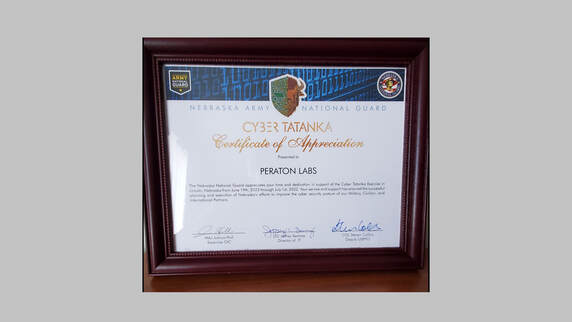Cyber Tatanka, a first-of-its-kind joint cybersecurity exercise hosted by the Nebraska Army National Guard (ARNG), brought more than 100 troops and civilians together in late June 2022. Held in Lincoln, Nebraska, with participants from the electric utility, banking, and other industries and foreign partners, Cyber Tatanka improved preparedness for coordinated cyber defense across military and industry. Peraton Labs supported the training by providing an affordable, high-performance cyber training environment for participants, both locally in Nebraska and internationally.
Peraton Labs configured a custom virtual threat environment (VTE) for Cyber Tatanka and worked with the Nebraska ARNG to develop training materials and conduct the exercise. The VTE was built using CyberVAN, our high-fidelity network environment for cyber experimentation, operational planning, validation, and training. CyberVAN is ideally suited for such cyber events because it can be hosted in Peraton Labs’ private cloud environment, requiring no equipment setup or tear-down for the event, and delivers high-performance access to participants located anywhere around the world.
During the exercise, the attendees – members of nine different “blue teams” – worked together to detect and respond to a broad range of cyberattacks launched in real time by a Peraton Labs “red team.” Prior to the exercise, Peraton Labs worked with the Nebraska ARNG to design and set up multiple VTE enclaves – essentially, replicas of small enterprise networks – complete with different operating systems, services, vulnerabilities, and network equipment. Peraton Labs also designed vignettes of increasing complexity to subject blue teams to increasingly sophisticated cyberattacks that required a coordinated response to successfully defend their enclave. Peraton Labs conducted instructional training on the environment, provided real-time VTE support, acted as the red team, and delivered daily hotwash sessions and after-action reviews.
“We were honored to be the vendor for the Cyber Tatanka exercise,” said Petros Mouchtaris, Ph.D., president, Peraton Labs. “CyberVAN has tremendous potential as a flexible and agile platform for cyber training events. We look forward to continuing to provide affordable, realistic, and high-performance cyber training support to meet the needs of the National Guard and other military and civilian organizations and international partners.”
CyberVAN provides a realistic, high-fidelity cyber range that enables flexible experimentation in a virtualized environment. A key differentiator of CyberVAN is that it represents the underlying network in a discrete event network simulator and represents hosts using virtual machines that communicate over the simulated network. This capability enables highly realistic modeling of heterogeneous networks, including enterprise, military, and utility networks, as well as the Internet.
CyberVAN complements this capability with a large suite of management, traffic generation, and data collection tools that support a variety of use cases including cyber training, cyber test and evaluation, digital twins, and generating cyber datasets to train artificial intelligence and machine learning models. Customers can either access Peraton Labs’ private, cloud-hosted CyberVAN instance remotely, or set up their own custom instance at their facilities.
Peraton Labs configured a custom virtual threat environment (VTE) for Cyber Tatanka and worked with the Nebraska ARNG to develop training materials and conduct the exercise. The VTE was built using CyberVAN, our high-fidelity network environment for cyber experimentation, operational planning, validation, and training. CyberVAN is ideally suited for such cyber events because it can be hosted in Peraton Labs’ private cloud environment, requiring no equipment setup or tear-down for the event, and delivers high-performance access to participants located anywhere around the world.
During the exercise, the attendees – members of nine different “blue teams” – worked together to detect and respond to a broad range of cyberattacks launched in real time by a Peraton Labs “red team.” Prior to the exercise, Peraton Labs worked with the Nebraska ARNG to design and set up multiple VTE enclaves – essentially, replicas of small enterprise networks – complete with different operating systems, services, vulnerabilities, and network equipment. Peraton Labs also designed vignettes of increasing complexity to subject blue teams to increasingly sophisticated cyberattacks that required a coordinated response to successfully defend their enclave. Peraton Labs conducted instructional training on the environment, provided real-time VTE support, acted as the red team, and delivered daily hotwash sessions and after-action reviews.
“We were honored to be the vendor for the Cyber Tatanka exercise,” said Petros Mouchtaris, Ph.D., president, Peraton Labs. “CyberVAN has tremendous potential as a flexible and agile platform for cyber training events. We look forward to continuing to provide affordable, realistic, and high-performance cyber training support to meet the needs of the National Guard and other military and civilian organizations and international partners.”
CyberVAN provides a realistic, high-fidelity cyber range that enables flexible experimentation in a virtualized environment. A key differentiator of CyberVAN is that it represents the underlying network in a discrete event network simulator and represents hosts using virtual machines that communicate over the simulated network. This capability enables highly realistic modeling of heterogeneous networks, including enterprise, military, and utility networks, as well as the Internet.
CyberVAN complements this capability with a large suite of management, traffic generation, and data collection tools that support a variety of use cases including cyber training, cyber test and evaluation, digital twins, and generating cyber datasets to train artificial intelligence and machine learning models. Customers can either access Peraton Labs’ private, cloud-hosted CyberVAN instance remotely, or set up their own custom instance at their facilities.


